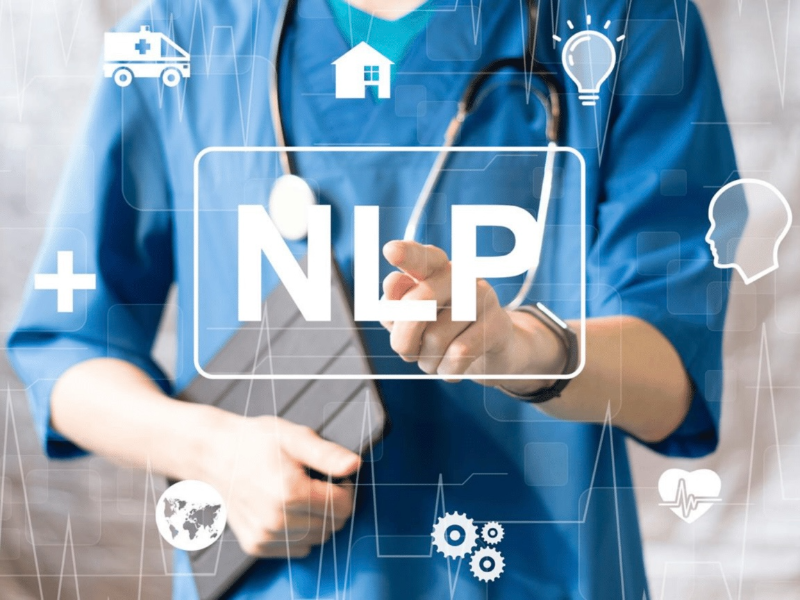- Natural language processing (NLP) improves the accuracy and efficiency of clinical documentation by extracting relevant information from physician notes and automatically populating fields in Electronic Health Records (EHRs), reducing administrative burdens on healthcare providers.
- NLP analyses patient records to identify patterns and trends, enabling early intervention and personalied treatment plans by predicting future health risks, such as the likelihood of developing chronic diseases.
- NLP mines scientific literature to identify potential drug candidates and new therapeutic uses for existing medications, automating data extraction from research papers and accelerating the drug discovery process.
Natural Language Processing (NLP) is a rapidly evolving field within artificial intelligence (AI) that focuses on the interaction between computers and human language. Its goal is to enable machines to understand, interpret, and generate human language in a way that is both meaningful and useful. In healthcare, NLP is transforming the way data is handled, offering promising advancements in medical research, clinical practice, and patient care.
The basics of NLP in healthcare
NLP combines computational linguistics, computer science, and data science to process and analyse large amounts of natural language data. In healthcare, this data often comes from a variety of sources, including:
Electronic health records (EHRs)
These contain a vast amount of unstructured data such as physician notes, discharge summaries, and patient histories.
Medical literature
Scientific articles, research papers, and clinical guidelines provide valuable information that can be mined for insights.
Patient communication
Interactions between patients and healthcare providers through emails, messages, or voice recordings.
By applying NLP techniques, these diverse and complex datasets can be translated into structured data, making it easier for healthcare professionals to access and utilise critical information.
Also read: Combining the fantasy of healthcare with speech recognition
Key applications of NLP in healthcare
1. Enhancing clinical documentation
One of the primary uses of NLP in healthcare is improving the accuracy and efficiency of clinical documentation. NLP algorithms can extract relevant information from physicians’ notes, automatically populate fields in EHRs, and ensure that important patient information is not overlooked. This reduces the administrative burden on healthcare providers and allows them to spend more time with patients.
2. Information retrieval
NLP enables sophisticated search capabilities within large medical databases. Clinicians and researchers can quickly find pertinent information related to specific conditions, treatments, or patient populations. For instance, NLP can help identify patients eligible for clinical trials by scanning through EHRs for matching criteria.
3. Predictive analytics and risk assessment
By analysing patient records, NLP can identify patterns and trends that might indicate future health risks. This allows for early intervention and personalised treatment plans. For example, NLP can help predict which patients are at risk for developing chronic diseases such as diabetes or heart disease based on their medical histories and other relevant data.
4. Sentiment analysis and patient experience
Understanding patient sentiment through analysis of feedback, reviews, and social media posts can provide insights into patient satisfaction and areas needing improvement. NLP can analyse this data to gauge patient sentiment, helping healthcare providers enhance the overall patient experience.
5. Drug discovery and development
NLP plays a crucial role in mining vast amounts of scientific literature to identify potential drug candidates and new therapeutic uses for existing medications. It can automate the extraction of relevant data from research papers, speeding up the drug discovery process and helping bring new treatments to market more efficiently.
Challenges and considerations
While NLP holds significant promise for healthcare, it also faces several challenges:
Data privacy
Ensuring the privacy and security of patient data is paramount. NLP systems must comply with regulations such as HIPAA (Health Insurance Portability and Accountability Act) in the United States.
Data quality
The accuracy of NLP systems depends on the quality of the input data. Inconsistent, incomplete, or inaccurate records can lead to errors.
Complexity of medical language
Medical terminology is highly specialised and varies between different fields and regions. NLP systems must be trained to understand these nuances.
Interoperability
Integrating NLP tools with existing healthcare systems and ensuring they work seamlessly together is essential for maximising their utility.
Also read: How to prevent healthcare data breaches?
The future of NLP in healthcare
As technology continues to advance, the applications of NLP in healthcare are expected to grow. Future developments may include more sophisticated AI models that can provide deeper insights and predictions, real-time language translation tools for multilingual patient populations, and enhanced patient engagement through virtual assistants and chatbots.
NLP is revolutionising healthcare by transforming unstructured data into actionable insights. By improving clinical documentation, aiding in information retrieval, enhancing predictive analytics, and more, NLP is helping to create a more efficient, effective, and patient-centered healthcare system. As we continue to harness the power of language and technology, the potential benefits for patients and providers alike are immense.

